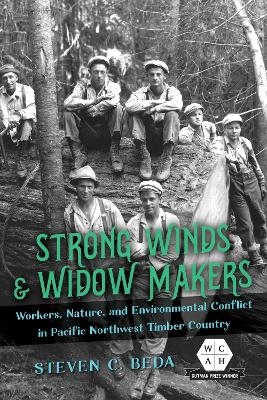
Strong Winds and Widow Makers
Workers, Nature, and Environmental Conflict in Pacific Northwest Timber Country
Seiten
2022
University of Illinois Press (Verlag)
978-0-252-08682-3 (ISBN)
University of Illinois Press (Verlag)
978-0-252-08682-3 (ISBN)
Winner of the 2022 Philip Taft Labor History Book Prize
Often cast as villains in the Northwest's environmental battles, timber workers in fact have a connection to the forest that goes far beyond jobs and economic issues. Steven C. Beda explores the complex true story of how and why timber-working communities have concerned themselves with the health and future of the woods surrounding them. Life experiences like hunting, fishing, foraging, and hiking imbued timber country with meanings and values that nurtured a deep sense of place in workers, their families, and their communities. This sense of place in turn shaped ideas about protection that sometimes clashed with the views of environmentalists--or the desires of employers. Beda's sympathetic, in-depth look at the human beings whose lives are embedded in the woods helps us understand that timber communities fought not just to protect their livelihood, but because they saw the forest as a vital part of themselves.
Often cast as villains in the Northwest's environmental battles, timber workers in fact have a connection to the forest that goes far beyond jobs and economic issues. Steven C. Beda explores the complex true story of how and why timber-working communities have concerned themselves with the health and future of the woods surrounding them. Life experiences like hunting, fishing, foraging, and hiking imbued timber country with meanings and values that nurtured a deep sense of place in workers, their families, and their communities. This sense of place in turn shaped ideas about protection that sometimes clashed with the views of environmentalists--or the desires of employers. Beda's sympathetic, in-depth look at the human beings whose lives are embedded in the woods helps us understand that timber communities fought not just to protect their livelihood, but because they saw the forest as a vital part of themselves.
Steven C. Beda is an assistant professor of history at the University of Oregon.
Introduction: A Place in the Forest Part I: Place
Chapter 1. “The New Empire”
Chapter 2. “The Prodigal Yield of the Surrounding Hills”
Chapter 3. “A Goodly Degree of Risk”
Part II: Power
Chapter 4. “Conservation . . . from the Guys Down Below”
Chapter 5. “The Many Uses and Values of Forests”
Part III: Problems
Chapter 6. “Strong Winds and Widow Makers”
Chapter 7. “Tie a Yellow Ribbon for the Working Man”
Chapter 8. “We Keep Carbon-Eating Machines Healthy”
Acknowledgments
Notes
Index
| Erscheinungsdatum | 30.11.2022 |
|---|---|
| Reihe/Serie | Working Class in American History |
| Zusatzinfo | 19 black & white photographs |
| Verlagsort | Baltimore |
| Sprache | englisch |
| Maße | 152 x 229 mm |
| Gewicht | 513 g |
| Themenwelt | Sachbuch/Ratgeber ► Geschichte / Politik ► Regional- / Landesgeschichte |
| Sachbuch/Ratgeber ► Natur / Technik ► Natur / Ökologie | |
| Geisteswissenschaften ► Geschichte ► Regional- / Ländergeschichte | |
| Naturwissenschaften ► Geowissenschaften ► Geografie / Kartografie | |
| Wirtschaft | |
| ISBN-10 | 0-252-08682-1 / 0252086821 |
| ISBN-13 | 978-0-252-08682-3 / 9780252086823 |
| Zustand | Neuware |
| Haben Sie eine Frage zum Produkt? |
Mehr entdecken
aus dem Bereich
aus dem Bereich
von der Staatsgründung bis zur Gegenwart
Buch | Softcover (2023)
C.H.Beck (Verlag)
12,00 €


